
Vol. 1, No. 25 Published by India China Division, Air Transport Command July 5, 1945
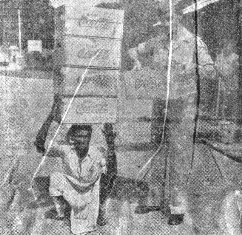 "Put it on his head and he can carry it." So goes the tradition about coolies throughout India. To prove
this, Sgt. Clarence Zika, classification NCO at the 1307 in New Delhi, stacked full coke cases on the noggin of "Tex,"
the PX handyman who walked away with all honors, and the cokes.
"Put it on his head and he can carry it." So goes the tradition about coolies throughout India. To prove
this, Sgt. Clarence Zika, classification NCO at the 1307 in New Delhi, stacked full coke cases on the noggin of "Tex,"
the PX handyman who walked away with all honors, and the cokes.
|
Liuchow Victory Complete
As Chinese Force Enters
Smashed and Burned City
Airfield and Town Retaken
After Jap Occupation of Eight Months
Chungking - After several months of hard fighting in the area of the Liu River and the Kweilin-Kwangsi area Chinese troops have retaken the town and the airfield of Liuchow.
Aided by planes of the 14th and Chinese Air Forces, three columns of soldiers pushed into the town from the west and the southwest. The town, which was still burning from enemy fires, was captured on June 30, according to reports from the Chinese high command.
Liuchow fell to the Japanese Nov. 7, 1944. It is situated at a point in the southern portion of the Indo-China border. That corridor is essential to any enemy retreat to the north.
Although enemy communications with northern troops apparently have been severed, Liuchow served as an enemy point of departure by water to the ports of Canton and Hong Kong.
At present Chinese troops are engaging the enemy to the south of the city. While ground troops were pushing northwards towards the town of Kweilin, planes of the 14th Air Force were striking at Jap supply and transportation lines in north, south and central China. Forty locomotives were destroyed on all fronts by the fighters. Fourteen river boats of more than 100 feet in length and 206 small boats including junks, sampans and other craft were put out of commission. Several bridges were destroyed on three railroad lines.
Mustangs attacked Ft. Bayard on Liuchow peninsula, damaging a radio station and vehicle and storage areas. On the same mission fire bombs were dropped on the docks and storage area of Hoihow, principal port of northern Nainan island.
'I'm in Jorhat, Mom' Letters Now May Say
Hq., Calcutta - Permission has been granted by Headquarters, Army Air Forces, India-Burma Theater, to release the geographical location of all AAF Base Units which are not engaged in tactical operations or which are not preparing to engage in such operations.
This will include ICD bases in the India, Assam and Bengal wings. These geographical locations may be revealed in personal correspondence.
Whereas men previously could write only that they were stationed at 1330 BU, they may now say they are stationed at "Jorhat in the Assam Valley." It is the same with other stations in the Valley which are considered vital to the mission of ICD but not engaged in tactical operations.
ETO Scribe Visits Here On Way East
Veteran Army Newsman Tells Impressions of Baksheeshland
By Sgt. Don Williams
Mediterranean Stars and Stripes Correspondent
Karachi - Coming to the I-B Theater from Italy seems almost like a return to the Tunisia of two years ago - to the heat and dust and to the vast distances between towns. I say almost. If what the boys here at the ATC base tell me is true - that Karachi is the second coolest spot in India with the exception of the mountain areas - then Tunisia almost might qualify as a winter resort. And when you get back home - oh happy day - you can tell that to your friends who were in Tunisia, when they start to tell you how hot it was there.
No Bananas
Coming to India, though, is a new and interesting experience, as is any first visit to a foreign country. This same ATC crowd, however, which brags of the advantage of Karachi over Calcutta or New Delhi, assures me that the novelty wears off after a couple of years! They are probably right. And I'd be the last one in the world to dispute them because I am not particularly interested in staying here that long to find out for myself. (I'm en route to the Philippines now.)
Yet, India's got something Italy doesn't have. For instance, there's bananas. They serve banana splits in town here. I wonder if you realize that people back in the States have almost forgotten what a banana tastes like (my friends tell me so in letters). And as for Italy - the Italians have a lot of spaghetti and oranges and red wine, but bananas - they are a rarity.
Then there's this little business of driving on the left hand side of the road. It's done in England, I know, but somehow it doesn't seem quite right.
Ah, Signoritas!
I don't suppose there's anything that can be done about it but the auto repair business shapes up as a good racket to get into after the war, particularly on Sundays when all the ex-GIs take their wives and 12 little points out for an afternoon spin.
And how about the sarees? I suppose you guys who have been over here awhile have learned to appreciate the twist of the thing. But to a very gullible visitor it certainly looks as if a gal goes to an awfully lot of trouble to get herself dressed up.
India's quite a country. But Italy's got its points, too. (I'll swap both and throw in France for good measure, though, just to step onto the boat that has a rush date with the Staten Island ferry). For instance there's Naples. You've heard that old expression "See Naples and Die?" A lot of people will swear to the aptness of that saying after they see the city.
And there are the signoritas. There's plenty of them and the farther north you go, the prettier they seem to get. So if you get a furlough to Italy start at the toe of Italy and work up. You'll take progressive interest in your work. You'll be disappointed in Venice. The gondolas are all black, the gondoliers do not sing love songs, and ducks are running up and down the Grand Canal loaded with supplies. You can't keep the Army out of anything these days.
But heck - anything's better than India-Burma (that's ATC talking again). As for me. I'll keep my eyes open and my mouth closed.
Neglects To Stop Coolies
War Correspondent Starts Work Process; It Continues
1333 BU, Chabua - It's one thing to put a bunch of coolies to work, but a war correspondent here learned that it's also important to tell them to stop.
Photographing the runway, the correspondent wanted to obtain some local color. Rallying a handful of laborers, he put them to work on the south end, supposedly doing repair work. He said: "When a plane passes by, I'm going to take the picture, so start digging as soon as you see me wave my hand."
They nodded understandingly and the photographer took his position, waiting for the plane.
The plane whizzed by, the coolies started digging, and the photographer clicked his camera. Satisfied, he jumped into his jeep and rode to the north end of the runway to take some other pictures.
A half hour later, while passing the south end again, the photographer noticed his coolies still on the job, digging away with picks and shovels.
Arctic Rescue Crew Now 'Sweating It Out' in IBT
Hq., Calcutta - It's a long jump from flying a ski-plane over the Arctic to handling an assignment in the tropical heat of India, but a handful of men now stationed in I-B have made that transition.
Sitting at his desk in the heat of headquarters here, Capt. James D. Carroll, Pittsburgh, assistant division navigation and briefing officer, unfolded the story of an Arctic rescue mission which took the first ski-equipped C-47 on three round trips over the magnetic north pole.
Northwest Passage
A call for help came in September, 1943, from the Canadian government which requested the AAF to rescue a Mr. and Mrs. Heslop, who managed a northern fur-trading outpost for Hudson's Bay House, and a clerk who had be marooned on Somerset island in the Arctic archipelago since 1941.
The island lies north of Bellott strait, known to explorers as "Northwest Passage," and was so hemmed in by ice for two years that the supply ship "Nascopie" had been unable to deliver supplies. Only contact of the trio with the outside world was by radio - and the batteries of that were almost dead when the emergency call was sent.
Capt. Carroll was navigator of the First Troop Carrier command rescue unit which was organized. Others who made the trip and are now in the I-B Theater are Maj. Homer A. Humphries, Texarkana, Tex., Bengal wing weight and balance officer, who served as supply officer; Capt. Oliver D. Packard, Los Angeles, now CO of a postal unit in the Calcutta area, rescue photo officer and historian; T/Sgt. Robert C. Weis, crew chief, now with a Combat Cargo group near Bhamo, and S/Sgt. Joseph C. James, radio operator, now with a Combat Cargo outfit attached to ICD.
Missed First Try
The mission was undertaken under Brig. Gen. F. W. Evans, then commander of the First TCC, now a member of the I-B AAF staff. Another in the party was Maj. J. F. S. Fletcher, British-born special Arctic adviser to ATC.
The rescue ship followed ATC's Crimson route to Coral harbor on Southampton island, northernmost AAF landing field, which was used as its operational base. The plane hopped off for Somerset, but failed to find it on the first try.
On the next day the C-47 on skis, loaded 5,000 pounds over capacity, waddled down the runway and headed into the almost perpetual Arctic night. Eleven hours later, Maj. Fletcher parachuted to Somerset island and was picked up by dogsled and carried 20 miles to the spot where the Heslops and their clerk were waiting anxiously.
Safe Landing
The plane dropped a load of supplies and a "Gibson Girl" emergency radio for Maj. Fletcher to use in communicating with the rescue group's operational base.
When the arrangements had been completed and Maj. Feltcher had made sure the runway was safe for a landing, he notified Coral harbor and the plane took off. The C-47 flew through the Arctic blackness with its heavy load. As it approached the island hours later, the plane came in on the beam from the "Gibson Girl" Maj. Fletcher had set up.
The airplane made the approach with one wing low, in order to squeeze between ridges. It landed safely with its cargo of such staples as flour, sugar and salt for the Eskimos. The temperature was 58 degrees below zero. Landing just at sunrise, to take advantage of the hour and a half of daylight, the crew got busy unloading and making arrangements to evacuate the trio of traders. The hazardous takeoff was made safely, literally up the side of a ridge, and the Heslops and their clerk were flown to Winnipeg.
Mother, Son Get Together at 'Dunker Den' in Assam
1325 BU, Chabua - Mrs. Lyla Hoffman, ARC director of "Dunker Den" club here, takes a special interest when preparing a bundle of doughnuts for an infantry outpost near Lashio. The recipient is, in most cases, S/Sgt. William R. Hoffman, her son.
The family of Hoffmans, four in all, became 100 percent service folk when Mrs. Hoffman's youngest son, James, 18, enlisted in the Marines a few weeks ago after graduating from Staunton Military Academy. The head of the family is Col. Don Hoffman, now with the U.S. engineers in Germany.
Long before the war, the Hoffmans were actively engaged in war work. Father Don left his position as Eldorado County engineer in 1938 to join the Corps of Engineers. Son William volunteered as an ambulance driver with the American Field Service and was with the first contingent to go overseas. With two members of the family abroad and a third in military school, Mrs. Hoffman joined the Red Cross requesting overseas duty.
With a son in Africa and husband in England, Mrs. Hoffman was sent to India, placing each member of the family on a different continent. William Hoffman completed two years with AFS, returned to the States to enlist in the Army. On his way to Burma, he managed to stop at Assam to say hello to mother for their first reunion in more than three years.
Assam-Made Gin and Rum Pretty Poor
Colonel Watches Whisky Wallah Mix Mash With Feet
Ed.-A lieutenant colonel, traveling with the group of U.S. writers touring the theater currently in a special C-54, has found time to stop and catch a few answers to a question many Assam (and Bengal too) drinkers have asked themselves in vain: What makes Injun likker click? (Also, what makes it bang, boom, disintegrate tissue, generate unwholesome fancies, cause visions, and make non-existent voices audible?) Hump Express presents this milestone of research with pride and gratitude.
By Lt. Col. Walter Stewart
Assam - I have long noted (purely in the interests of science) that Indian whisky tastes rather like glue which has been thinned with kerosene and strained through the beard of a baboon. And you need not be amazed to learn that I have hounded the mystery to its foul lair and learned why it tastes that way.
Buffalo Wallow
There is a distillery in amiable Assam which disgorges this whisky in great quantities. The visitor is immediately assured of sanitation, for en route to the inner sanctum he passes the small pond (or buffalo wallow) where the bottles are cleaned. Women and children in varying states of disarray, etc., crouch in thickish liquid and give the bottles a pretty spirited tussle. You may rail against this method, but I will say in defense that it doesn't seem to make the bottles any dirtier than they were to begin with.
Then comes the mash pit. This is knee-deep with some sort of repulsive goo which gleams sleekly and gives off an odor like embalming fluid's. That is, it is knee-deep for a tall man, but a trifle deeper for the gals (and quite deep indeed for the kiddies) who troop through, hoofing the mixture and shouting mirthfully. (I suppose they are happy because they never drink it.)
Scotch - Rumor !
Then comes the journey through a metal tube of uncertain alloy, and the nectar comes to rest in one of three vats. These are labeled "gin," "whisky," and "brandy." Certain things are added for the sake of color, and to assure diversified hangovers.
The Assamese director had saved his true masterpiece for the last. Pointing one quivering finger, from under the nail of which a bat flew as he raised his hand, he directed my attention to a vat in the process of construction and clarioned, "Soon we have Scotch."
Swearing eternal temperance, or at least duration temperance, I hurried away.
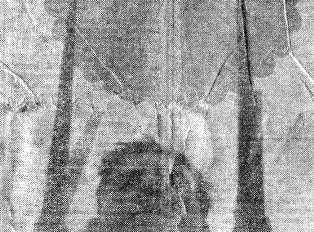 He floats through the air with the greatest of ease and takes his own picture, as cool as you please. Lt. Arthur
W. Glaser, of Fairfax, Calif., a co-pilot flying from 1328 BU is Assam, had to jump recently and made his camera work
for him on the way down.
He floats through the air with the greatest of ease and takes his own picture, as cool as you please. Lt. Arthur
W. Glaser, of Fairfax, Calif., a co-pilot flying from 1328 BU is Assam, had to jump recently and made his camera work
for him on the way down.
|
Marines Hand Out Cigarets
As Japs Hold Suicide Show
Okinawa (ANS) - A fantastic story of a Marine lieutenant who stumbled into a pocket of 350 armed Japanese and wooed them with cigarets for two hours, while broadcasting a blow-by-blow description if their mass suicides, and then came out with 150 prisoners, was revealed here.
First Lt. George Thompson, Dorchester, Mass., and four other Marines passed out some cigarets while he used his walkie-talkie to broadcast the scene of self-destruction. Outnumbered and helpless, Thompson just grinned, waved, bowed and hid his weapons while shouting, "Tobacco." He also kept chattering over the radio to the CP of the Sixth Marines' 29th regiment. He warned the post not to interrupt, saying "I've an idea that if I stop talking they will kill us."
Suicides began with Japanese officers killing the women who accompanied them, then killing themselves at the rate of one per minute. At the same time Jap officers continued to give up their sabers, watches and flags to the amazed Marines.
With an offer of a pack of cigarets Thompson lured 153 toward the American lines, just yards from the bloody remains of the suicides. Already startled beyond belief, the Marines could only goggle when 350 Okinawa civilians poured out of caves following the Japanese prisoners.
Thompson stated, "What a broadcast!"
Test Bench Made From Spare Parts
Motor Can Be Controlled by Colored Buttons and Gadgets
1306 BU, Karachi - From unwanted bits of wire, dabs of junked airplane parts, and a lot of brain work and elbow grease, electric shop enlisted men on this base have set up a test bench that is, so far as they know, completely new to the theater.
Especially designed for finding the kinks in broken down power, the bench is the electrician's answer to a "definite shortage of aircraft generator accessories."
Powered by an old Waukesha engine, the whole testing system is built on an unusual remote control basis. Far and away from the electric shop, the motor - protected from the dust by a nailed together shack - can be started, stopped, slowed, speeded, all by pushing the various luminous painted push-buttons on the test bench. All in all, the "accessory tester" resembles the generator system of an airplane.
Working on three rotating shifts, everyone in the electric shop had his hands on this project. They are Sgt. Loren O. Pulliam, Purdin, Mo.; Sgt. Elson C. Austin, Strasberg, Ohio; Cpl. Elmer G. White, Jr., Riverside, N.J.; Sgt. Albert G. Cowan, Hollywood, Calif.; Cpl. Walter O. Eaton, Los Angeles; S/Sgt. Howard H. Hermann, Akron, Ohio; Sgt. George N. Williams, Williamsville, N.Y.; S/Sgt. Earl C. Harper, Lindsay, Calif., and Cpl. William C. Carpenter, Denver, Colo.
CHINA This Week
by Dwight Coolie
BIG DEALER...
An intelligence officer walked into a local shop recently. He was intent on finding the leak that put GI supplies on the counters of the local stores instead of back in the PXs and private footlockers where they belonged.
While he was talking with the proprietor, angling to uncover certain dark deals, the guy looked at his jacket.
"Give you $50 for your jacket, want to sell? Good price."
The "detective" frowned, continued his questioning. In a while the little man interrupted again.
"Got any extra 45 pistols? Give you 4300 for 'em." Once again the gestapo ignored the questions and went on with his verbal hunt.
"Any GI blankets, clothes, cigarets, anything you got. I buy. You name plice, I pay. Lots of plofit. Ding how deal."
Finally the cop walked out in disgust. As he was getting into his jeep to drive away the dealer came to the door.
"Hey, that's nice car you got. Give you a couple few thousand dollars gold for it. No? Hokey. Come back, see me. G'bye."
SWEET STUFF...
It was a dark and stormy night when the pilot said to his crew, "Gosh, look at that." The boys from the 1342 BU stood amazed as they looked at the cargo for the trip.
Seventy bags of white sugar. That stuff is definitely a delicacy in China where the sugar is usually the color of the inside of a thunderhead over the Hump in March.
The flying was sort of rough that night and during the trip one of the sacks broke loose. To keep it from bounding around in the cabin the crew brought it up in the cockpit for protection. When the cargo was unloaded the single bag in front was forgotten (?).
It was "discovered" on the return trip and handed over to a surprised, but happy, mess officer. (That is, if a mess officer can ever be happy.)
Well, that's one way of doing it.
STRAY KAYS...
Now and again you hear lots of bad things about the black market which is supposed to be hot and heavy on the far side of the Rockpile. There's one good thing about the whole deal.
"K" rations (lost, stolen or gone astray) are for sale in many shop windows in some of the towns. It gives the GIs a chance to get something besides cucumbers, water buffalo, potatoes, cucumbers, water buffalo, potatoes, cucum . . . (this could go on for days, and it does!)
1-2-3 . . . RED LIGHT!
Chinese newspapers are most quotable - quote. "On account of the fact that many prostitutes have been found disguised as high-class ladies so as to induce Allied soldiers to drink or to do other things, the local public security authorities have put into effect orders strictly prohibiting such practices."
Hmmm, what do they prohibit? Drinking, or other things?
Any gal that can disguise herself that well shouldn't be in the business, she ought to be in "pitchers."
JEEP GAL!
Remember when we used to talk about the way girls were riding around in jeeps? Now they're even going a little farther - they're driving the four-wheeled critters.
Seems that up Chengtu-way a jeep, driven by a girl with two American soldiers as passengers, turned over while taking a dangerous curve. The local rag says "the girl could not drive well." After having a slight argument with a telephone pole (which it lost) the jeep turned over in a rut.
Which leaves us with the question, "who was taking what curve?"
Gen. Dan Sultan Pats ICD on Back for Aid
Hq., Calcutta - before relinquishing his command of the India-Burma Theater, Lt. Gen. Dan I. Sultan expressed his appreciation to ICD for "its splendid job" in hauling supplies over the Hump. "When I first arrived out here," the general wrote, "we were shooting for a goal of 10,000 tons a month. Now we are approaching 50,000."
Pointing out the gain is a result, to some extent, of the increase in the number of aircraft, he credited "ICD's untiring efforts to find improvements in the existing system" as a big factor in the accomplishment. he added:
"You can be proud of the unique operation and magnificent record of the ATC in India, Burma and China."
Flynn Has It Hard, Gets Cold Shoulder In Chabua Thriller
1333 BU, Chabua - Errol Flynn's latest cinema-thriller, "Objective Burma," played to a responsive audience here when a map flashed on the screen showing the location of Dibrugarh, Assam. To everyone in the audience, Dibrugarh is the favorite town in this area.
During the picture, Flynn was leading a party through the Burma jungles when they suddenly heard the sound of someone cutting his way through the undergrowth. All was tense as the audience waited to learn who it was.
"Ten to one it's a pilot walking out of the Hump!" one in the rear shouted. No one took his bet, though he'd have lost.
Near the last reel, most of the extras had been killed, leaving the star and a few leading players stranded on top of a mountain. The scene flashed to an airbase in India showing a plane taking off for the rescue.
"Yeah! Dumbo! Yeah!" the kibitzer shouted and everyone applauded.
The grim realism of the war in Burma was lost but everyone enjoyed the show immensely.
GIs Worry About Baldy With No Fringe On Top
1328 BU, Misamari - A serious condition confronts numerous GIs sweating out the war in the muggy climate of Assam. The particular wicked nature of the Indian heat and sun seems conducive to baldness among Americans.
They don't care whether they have a healthy crop of hair or a mere garland of fringe on the outer borders, as long as they're in India, but when they go home, that's a different story.
If a man is fortunate enough to return to Uncle Sugar with a lush crop of hair, his wife or sweetheart will greet him with the same ardor as she displayed in bidding farewell; but if the poor guy comes back hairless, he is likely to encounter a certain coolness and chagrin when his lady-in-waiting views his bald pate. In recognition of this acute problem, the Dragon, base newspaper here, has taken up the defense of the many hairless GI Joes.
First, in its appeal to the ladies of bald or balding men, the paper asks for tolerance and a continued ardent feeling toward their returning husbands and sweethearts. The Dragon then points out some of the lengths to which men in Assam go in order to defeat baldness:
1. They submit to the torture of a Hindu shampoo and massage with the allegedly salubrious coconut oil (one can't conceive the battering that the men take from these Hindu barber-chiropractors.
2. They buy coconut oil, expensive shampoos, and hair tonics.
3. They brush their hair (100 strokes each night).
4. They wear hats in the sun, but not indoors.
5. They pose for hours before mirrors, checking for the inroads of baldness.
One more consideration: Indian weather has no perceptible effect on the Assam GIs chest - it's just as hirsute as ever - if not more so. Therefore this added manliness should be weighted against the bald pate.
Gal Troubles Give Chaplain Headache
1333 BU, Chabua - Chaplain Orville T. Unger, called upon to make the routine sex lecture, learned later that it easily could be misconstrued.
After completing his lecture, the chaplain returned to his office, wondering whether his advice would be heeded when situations arose. A GI entered a few minutes later.
"Chaplain," he said, "when we guys get involved with women and get into some kind of trouble, you're supposed to help us out, aren't you?"
Chaplain Unger nodded.
"Well, I just got a letter from my girlfriend back home. She's pregnant, Sir. What are you going to do about it?"
Pilot Makes Round Trip Record Run
Shaves 40 Minutes from Mark on China Flight
1330 BU, Jorhat - A record round trip from 1330 in Assam to 1344 in China, made in April by Capt. Lloyd F. Melichar, has been bettered by 40 minutes by 1st Lt. Edmund G. Merhige, Hollywood, Fla., who made the flight in 6 hours and 25 minutes.
Lt. Merhige had planned the trip carefully, and selected a cargo that could be unloaded easily and rapidly and had chosen a day that seemed to have favorable weather conditions. On previous flights over this route he had recorded carefully all pertinent data for use on his record-breaking flight.
It took but a 30-minute layover in China to unload and then he was back in the air, winging it over the Hump. He encountered difficult headwinds and for a time it seemed that he would be unable to break the record for which he had planned.
Opening the throttle to the maximum safe flying speed, he bucked the headwinds. Coming in, he was notified by the radio operator that he had one minute in which to land in order to shave five minutes off the return leg record. Lt. Merhige received permission for a straight-in landing. As the plane settled on the runway two records were logged - a round trip record and a return leg record.
Other members of the crew were Lt. I. W. Thornton, Longview, Wash.; Sgt. Louis B. Tehan, Utica, N.Y., radio operator, and S/Sgt. Jay D. Howe, Leroy, Ind., aerial engineer.
40 Pilots Receive Commendation from Brig. Gen. Tunner
1348 BU, Burma - Forty officers from this base were commended last week by Brig. Gen. Tunner for their work in the movement of the Mars Task Force to the combat areas of China.
Hailed as one of the most important missions ever carried out by the ICD, the movement was described in an earlier issue of Hump Express. Commenting on the fact that the entire mission was completed without a single mishap, Gen. Tunner lauded them for their skill and airmanship.
The closing paragraph of the citation read: "Flying over the most hazardous terrain in the world, from air strips that were virtually carved out of mountains, during all types of weather both by day and by night, you displayed courageous devotion to duty and great ability in carrying out your assignment with distinction."
Helicopter Wasn't First One To Come To CBI, Is Advice
In the matter of helicopters, this paper sits corrected.
Its story of June 14 under the heading "Helicopter Is Being Used in Rescue Work" included the erroneous statement that the machine in question, recently delivered to Burma by C-54, was "the first helicopter used in this part of the world."
Correction comes from Lt. Robert F. McFarland, liaison officer, First Air Commando group.
"Over a year and a half ago," writes McFarland, "the First Air Commando group brought a number of YR4s to the CBI, and at least a year before your 'first flight' these egg-beaters were being used to evacuate downed and wounded men from inaccessible spots in Assam and Burma, frequently flying over enemy territory.
"This, incidentally, was the first use ever made of helicopter in any theater of operations, although someone in the ETO got credit for it because our group's achievements were still classified matter.
"I'm sure you will be happy to set the record straight on this matter, giving the First Air Commando group the credit due it without in any way detracting from the praise certainly due those who, profiting from our experience, carried out the successful rescue you described."
Hump Express is glad to set the record straight and grateful for this added information.
 Plenty Fireworks
Plenty Fireworks
If we had been home yesterday, we probably wouldn't have allowed the day to pass without shooting a few firecrackers or eating a picnic lunch or in some other simple but significant way of marking the Fourth of July.
Over here Independence Day passed without too much notice - formal notice, that is! But there must have been at least a subconscious awareness of the day as B-29 crews plastered Japan with their lethal stuff, as naval gun crews fired salvos against Nip targets, as Marines and infantrymen attacked island caves and machine gun nests, as transport crews battled zero visibility over the Hump.
Yes, there was plenty of real fireworks, not the kind that is kids' play but the kind that daily is bringing the Nip empire closer to the brink of destruction. The home-made skyrockets and the three-inch salutes and even the picnic lunches will have to be subordinated for a while to the greater fireworks in the East.
Independence day was named for the nation's first war, the one which made it free. battles are again being fought for American independence which would be lost if the encroachments of the world's aggressors were not halted by military blows.
While the U.S. soldier may be angry at times at the measure of freedom which being in khaki has taken from him, he still realizes that he is the most independent man under arms in the world - and much more independent than civilians in the lands which have been swept by tyranny and oppression which now must be crushed. The Fourth of July stands for this independence.
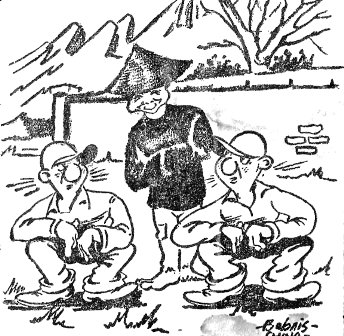 "Are you boys from India?"
"Are you boys from India?"
|
The WACs are here. ICD has WACs now!
What can we say to the gals to make them feel at home? (If we knew we'd tell it to ourselves and make us feel at home.)
Maybe it's hard to find just the right way to say hello because it's been so long since we stood at the corner of Chestnut and Broad and watched American ankles go down the street that we may seem wolfish!
It seems that a little bit of feminine America (and who will dispute that it is one of the most vital bits?) has arrived in India dressed in khaki skirts, wearing American lipstick on American smiles and American nail polish on American hands. They seem to bring us closer to home.
Maybe that's another reason why this thing is a bit of a puzzler. It's a little difficult to try to make them feel at home when their presence takes us a little closer to the States even though we're still in India-Burma and points beyond.
It brings to mind a similar occasion of many long years ago when the WACs put in their appearance at bases back in the States to free men for overseas duty. Now here it is again, and it leaves us with the question, "where now, little man?"
Perhaps when we were rookies we would have looked over our shoulder and asked "What are you doing here? Go home!" But not now. We have enough sense to say "Glad to see you, here is a job you can do, it's been waiting for you. Anything you do will help to shorten the number of trips over the Hump and the number of hours on the flight line under a broiling sun and the dreary days away from the U.S.A."
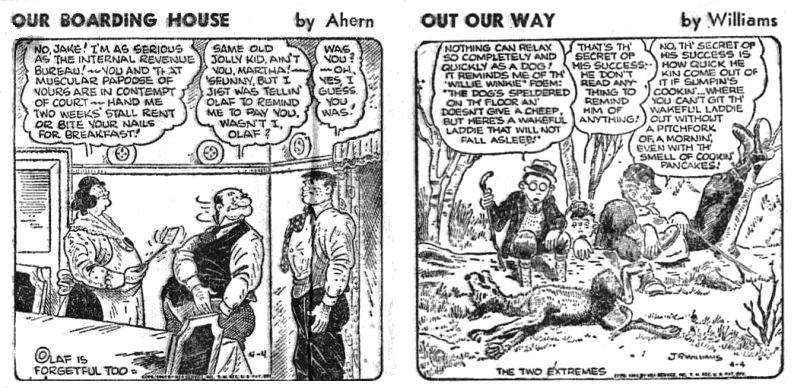
|

Chewing of Groundlings
Editor:
Ordinarily we Hump fliers don't have time to write gripes. And we do not think it fair to direct innuendoes at fellow soldiers. But after reading the letter from "nine ground wallahs" suffering illusions about rotation of fliers, we feel justified in writing an answer...
Have any of you lost buddies by wounds from flying paperclips, falling from a swivel chair, or other hazards of office work?
We feel you are not familiar with Hump operations, or you couldn't have written your letter. So we cordially invite you to help alleviate the shortage of radio operators by learning radio and joining us in this life of ease and tranquility. If then you are still of the opinion that flying personnel are pampered, we will most humbly apologize.
Our hats are off to ground personnel of this base, performing their duties silently and efficiently - and especially do we pay tribute to the engineers, who work long hours under trying conditions. They have to spend the same time as office men, and their time is spent working at tough jobs, and not publicizing gripes.
So again, "ground wallahs," we invite you to join us over the Hump and learn the real story. But if you want to make damn sure you get back to Uncle S. after your two years, stay where you are. It's safer there, and you will go home. Some of us won't.
- Sgt. Guy B. Upton, S/Sgt. William R. Young, Sgt. O. L. Haney, S/Sgt. Paul F. Howard
The wail of the nine paddle-feet in your June 21 issue was indeed a piteous lament. In our basha we feel that the groundmen are assured of eventually returning to the U.S. unless they stumble upon the freshly sharpened point of the dangerous Ticonderoga, or drown in their own tears of self-pity. Then too, they will be assured of employment, for every bank in the nation will be seeking men steeled against long and arduous working hours.
The poor groundling! He has only one day off per week! He has never experienced the exhilaration of being awakened at 2 a.m. for a refreshing jaunt across the scenic Hump! Instead he must sleep until his eyes are red and swollen (sometimes he even misses breakfast)...
- F/O Fred Sackett, Jr, 1328 BU (Misamari, India)
We want to express our deep sympathy to the Karachi Kommando... We realize that if he loses his pencil, the quartermaster is stuck. If we lose our ship or its load, of course, it's just 100% pilot error.
We realize too that the stench and the chances of being hit and run over by a camel are great in Karachi. We've lost friends on Tali, on the Salween Ridge, and off the end of the runway. Those boys will never have a chance to talk of going home.
We feel that your correspondent was misinformed, or else his letter would not have been written.
- F/O John S. Owens, F/O Fred C. Grainger, 2nd Lt. D. R. Monser, F/O W. B. Wallace, 2nd Lt. W. C. Davidson, S/Sgt. D. H. Goldin, Sgt. K. Moline, Sgt. H. Fredin, Sgt. N. C. Bach
Five Years
Editor:
I've read all about the rotation situation - no replacements, transportation difficulties, etc. I realize how things stand.
Now listen to this gripe, and then if you can tell me one good reason why I should stay overseas eight, six, four or two months longer, then I'll know I've gone out of my mind completely.
I enlisted in February, 1940, and shipped to the Panama Canal Zone in April. After three years there without a furlough, I was rotated back in April, 1943, and had a furlough, after which I was almost immediately alerted. I left on my second tour of overseas duty in July, 1943, and have been in India since.
So I have a total of 59 months overseas out of the past 62 months. And all that was spent in the tropics...
Five years is a long time.
My MOS is 405 (clerk), and my number of points is 114.
I read in the Roundup of June 14 that 1535 men were sent to the States, and their average number of points was 92...
The one question I want to ask is, will I ever go home?
- S/Sgt. Robert D. park, 1347 BU
P.S. I am not an old Army man, and intend to take a discharge as soon as possible.
- Ed.-It seems to us you may have one for the book there, son. Of course many of our island cousins stay abroad longer, but then they have an empire. We're giving your letter to those who may be able to get you home. Let us hear from you again. (P.S.-Your postscript is what we might call understandable.)
Errata, WACs, Scarcity
Editor:
Have been reading your fish-wrapper since the first issue, and have generally found it interesting. Recently, however, two points have been obvious: scarcity of stories on this base, and incorrect information in those printed.
In a recent issue, Hump Express insisted the commanding officer's brother-in-law, stationed here, is a WAC Pfc. I have met the colonel's brother-in-law and was convinced beyond any doubt that he is all man. The first WAC at this base has yet to arrive.
Another issue credited the 1328 BU with having won a basketball game our team fought for and won.
The latest issue claims that we're eating fresh
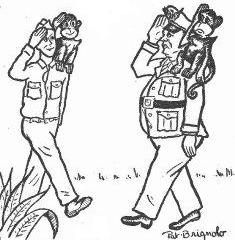
|
- Sgt. L. D. Rohrbeck, 1337 BU
Ed.-Let's take 'em one at a time: about the WAC business, one sentence said "This ironic situation, in which the highest-ranking wallah and one of the lowest-ranking married sisters, leaves Pfc. Kennedy in a dither." Ha ha. Stop pulling our leg.
We sincerely regret the slight upon your basketball team, and we hereby give a rap over the head to the reporter who snafued the egg story. As we understand it more fully now, eggs for breakfast every other day are an expectation only.
Scarcity of stories on any particular base originates at the base. If you're hiding any good copy from us, come clean; we need it allatime, allatime, and no benevolent nepotism about it either.
We Lose a Sale
Editor:
True or false: Hump Express is edited by Indian civilians.
- S/Sgt. Vincent Whelton, 1326 BU
Ed.-False, but you can get a subscription to the Hindusthan Standard for Rs. 48. A fine paper, too.
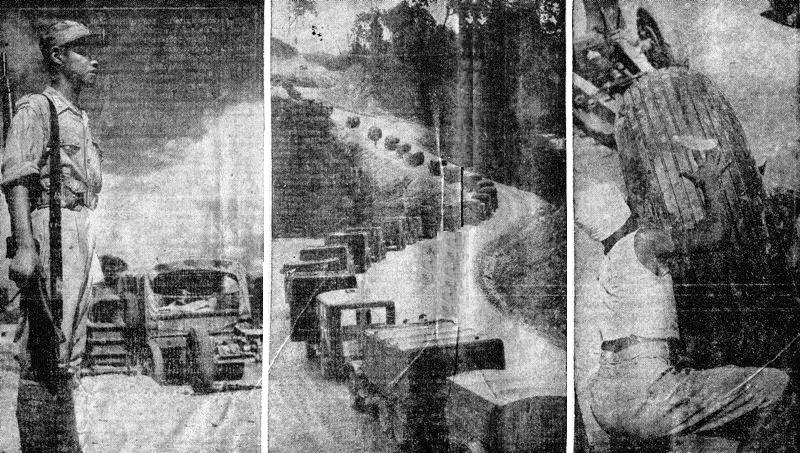
|
Officers and men of ICD, who do most of their traveling above the clouds, pitched in recently and solved the problem of scarcity of ground transportation by driving vehicles from Assam to Kunming along the Stilwell Road, in a giant ATC convoy. At the left is a Chinese soldier who stood guard near the end of the trail. The convoy (center) snakes its way up the hills. A lot of rubber gets reloaded (at right) into a truck along the route, by one of many negroes who traveled with the convoy.
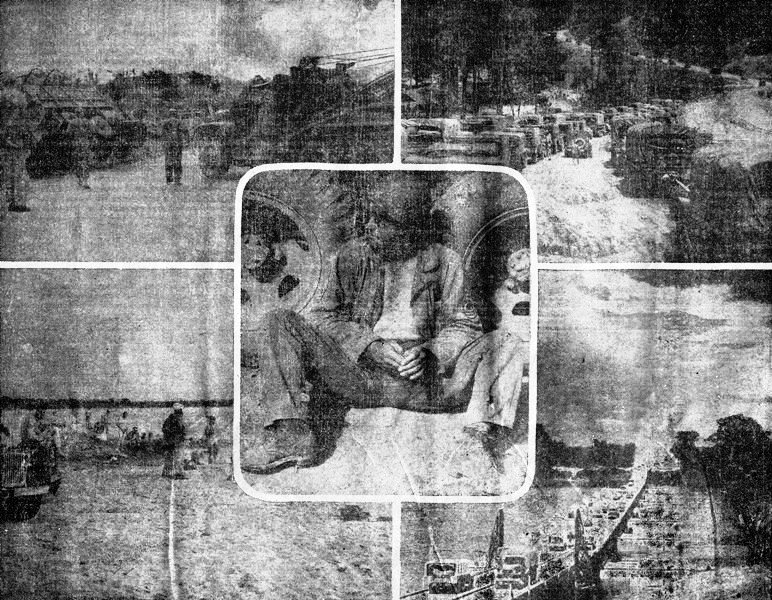
|
A six-by-six (upper left) is assisted out of a ditch by a wrecker. Neither truck nor crew was hurt. The convoy again pulls up, this time for chow (upper right). M/Sgt. Carl J. Maddoz (center) takes a bit of "wheel fatigue" before the motorcade moves on. There's nothing like a swim (lower left) to rinse off the dust and grime of travel. The beach is near Bhamo. The trucks rumble across a pontoon bridge over the Irrawaddy River (lower right) beyond Myitkyina, as they roll Chinaward.
Pitts To Get A Dispensary, Chinese Gift
Man Who Saved Paralysis Victim Is Honored By Townfolk
1338 BU, China - Pvt. Jack Pitts, the GI from Austin, Tex., whose efforts gave a young Chinese mother use of her paralyzed limbs (Hump Express, June 7) this week felt something like the man who built a better mousetrap.
Following close on the heels of Yank's Chinaside correspondent, AAF Combat Radio team No. 6 arrived at this BU with its compact equipment to interview Pvt. Pitts on the spot where he has been conducting his village sick call.
A modern magnetic wire recorder was set up in the old temple of the small village before three ancient idols who would shortly be displaced as the villagers remade the temple to Pvt. Pitt's specifications for a dispensary.
Blood-letting
Capt. Walter Sheldon, Philadelphia, got the story in his own words from Pvt. Pitts, and then asked Capt. Albert G. J. Cullum, assistant base surgeon, to comment. Pitts retold the story of how he'd come to this village taking pictures and, following a beckoning youngster, discovered a young mother unable to raise herself in bed.
he told of the infected sores made by a local doctor in his blood-letting. Pvt. Pitts said it was only a common-sense idea that caused him to have the woman carried to local hot sulphur springs. Every day for two months he paid for coolies to carry her to the springs for an hour's soak.
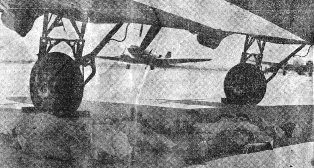 On the field at Karachi, seven weary wallahs rest from their labors under the sheltering wing of a C-47 at mid-day.
The one at left seems to be cold - or is he just keeping flies away?
On the field at Karachi, seven weary wallahs rest from their labors under the sheltering wing of a C-47 at mid-day.
The one at left seems to be cold - or is he just keeping flies away?
|
"At the end of that time," he said, "she was walking. Not perfectly, of course, but she can get around."
'An Inspiration'
After Pvt. Pitts had told his story, Capt. Cullum, who had completed an examination of the paralysis victim a few moments before, commented that she has the appearance of a much older person who has had a cerebral hemorrhage.
"Apparently," he said, "she has a brain lesion causing a central paralysis, but I wouldn't want to make a formal diagnosis after an examination such as I've had to make here. I'm very much interested in this case," he added, "and have taken a blood sample."
Capt. Cullum called Pvt. Pitts' use of the sulphur baths "an inspiration which should prove most beneficial in helping the patient to recover full use of her limbs."
Converting Temple
The medical officer added a commendation to Pvt. Pitts for his courage in attempting to educate the villagers to habits of sanitation. He called it a "tremendous job" but said that the results of Pitts' efforts were already visible, adding:
"The children I've seen in the village appear to be considerably cleaner than is generally the case in China. In treating the simple ailments that he does, soap and water are probably Pvt. Pitts' greatest aids."
At the conclusion of this part of the transcription the magistrate of the village, Yan Cee Chen, spoke in Chinese to thank the American GI for his work. He said that he would do all he could to hurry the work of converting the ancient temple and would co-operate in every possible way to help Pvt. Pitts.
AAF Combat Radio Team No. 6 is one of several scattered all over the world which furnish on-the-spot broadcasts from fighting fronts to the Blue Network program "The Fighting AAF," heard Saturday afternoon on a nationwide hookup.
Ordinarily concerned with combat operations, the team made its latest recording over the target in a Liuchow bombing mission. "However," said Capt. Sheldon, "a story like this is a wow. It's a change of pace, and worth traveling for."
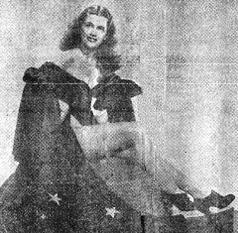 Just what this is supposed to signify beats the dehydrated cabbage out of ye chizkek ed., but it's
Jacqueline Joyce,
of the Holtsworth Model Service, of (remember?) New York. There's a brochure that tells about her, and it says:
"The original technicolor girl IN HER DANCE OF 1000 LIGHTS AND POPULAR SINGER STAGE, SCREEN, RADIO, HOTELS, NIGHT
CLUBS BANQUETS." (We feel she deserves better punctuation.)
Just what this is supposed to signify beats the dehydrated cabbage out of ye chizkek ed., but it's
Jacqueline Joyce,
of the Holtsworth Model Service, of (remember?) New York. There's a brochure that tells about her, and it says:
"The original technicolor girl IN HER DANCE OF 1000 LIGHTS AND POPULAR SINGER STAGE, SCREEN, RADIO, HOTELS, NIGHT
CLUBS BANQUETS." (We feel she deserves better punctuation.)
|
Hump Pilots Are Guided
By New Type of Beacons
Which Operate for Year
Acetylene Lights Installed
At Emergency Air Fields
Hq., Calcutta - Acetylene flashing beacons are being installed along Hump routes and remote airfields in China for use by ATC and other pilots as visual checks for navigation and in locating emergency landing strips.
The units are complete in themselves and need to be serviced only once a year. For this reason they are of exceptional value in isolated sections of the Hump and at fields where electrical power is limited.
Upon requisition, the units were airlifted from the U.S. and are being installed in Burma by Services of Supply, and in China's outlying airstrips by the 14th AAF.
The flashing light is turned on and off automatically by sunlight. When the sun rises the heat and light, acting upon a sensitive carbon element, shut, by means of a valve, the flow of acetylene, thus extinguishing the beacon. In the evenings, when the heat and light of the sun no longer act upon the carbon element, the valve reopens, allowing the acetylene to flow to a pilot light which ignites the beacon.
These light units contain sufficient acetylene to operate for a year without refilling.
The lights will not penetrate clouds and are more for check-points in night flying than other instrument flying. The beacons are expected to be of incalculable aid to lost pilots in finding emergency fields in China and the outer Hump regions which have no landing lights.
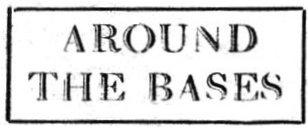 US ON A BUS
US ON A BUS
1338 BU, China - The old "sardine shuffle," six-by-six truck used here to haul GIs around, has a new air-horn. When Cpl. E. B. Tomberlin, Cashmere, Wash., installed the horn he thought nothing special about it. But the horn turned out to be a sure-fire reminder of home, bringing memories with every blast. To some it brings back the sound of fog warnings on Puget Sound, to some the streamliner pulling into Philly and to others memories of Saturday nights when sister's boy friend used to call.
FOR THE BIRDS
1346 BU, Tezgaon - Before coming overseas last year, Chaplain William P. McMullen, Buffalo, N.Y., filled out a questionnaire for the Army. It was complete, down to hobbies. Under the general heading the chaplain wrote, "ice skating, ice hockey, tobogganing, etc." It was his intention to acquaint the authorities with his love of the cold climate.
Last week he received another questionnaire, same type, with another space for hobbies. This time he wrote - "collecting tropical birds."
IN THE BAG
1328 BU, Misamari - Air freight, at this base, turned over to T/Sgt. Armen Benincase, line chief, the two barracks bags which he lost 14 months ago after being sent to the hospital for shrapnel wounds suffered in the fighting at Imphal. Among the articles he found were the shrapnel-pocked overalls he was wearing when he was hit. Friends say Benincase must have sensed he would be gone for a while. Judging from the amount of stuff in his bag, he was all set for a permanent change of station. (He almost got one, out of this world.)
HOPEFUL
1333 BU, Chabua - Col. Charlie F. Skannal, the CO, gives out with this one:
Once upon a time there was an airline pilot. He was lost. After flying around in the fog of the east coast, USA, the fuel started to get low and since in those days they didn't have all the tricky devices that are now in use for instrument let-downs, a real blind landing was imminent. The co-pilot was, to put it mildly, a little nervous. As the plane made its descent, nearing the ground rapidly, he asked in a weak voice, if he should put the gear down.
"Hell yes," said the pilot, "we might hit an open field."
HUMP EXPRESS is the official newspaper of the India-China Division, Air Transport Command, APO 192, c/o Postmaster, New York, N.Y., and is published by its Public Relations office. Camp Newspaper Service and Army Newspaper Service features are used, reproduction of which is prohibited without permission of CNS and ANS, 205 East 42nd St., New York, 17, N.Y. Other material is submitted by staff members, ICD-ATC base Public Relations sections and other soldier correspondents. Printed weekly by the Hindusthan Standard, 3 Burman St., Calcutta, India, and distributed each Thursday. Passed by U.S. Press Censor for mailing.
| Military transport schedules over India for cargo, personnel and mail . . . maximum tonnage of essential war materials over the Hump . . . movement of troops and supplies in support of tactical operations in China . . . evacuation of the sick and wounded - these are the missions of ICD-ATC. |

JULY 5, 1945
Original issue of HUMP EXPRESS shared by CBI veteran Steven C. King, author of Flying the Hump to China.
Copyright © 2007 Carl Warren Weidenburner
TOP OF PAGE PRINT THIS PAGE ABOUT THIS PAGE E-MAIL YOUR COMMENTS
PREVIOUS ISSUE HUMP EXPRESS BASE NEXT ISSUE